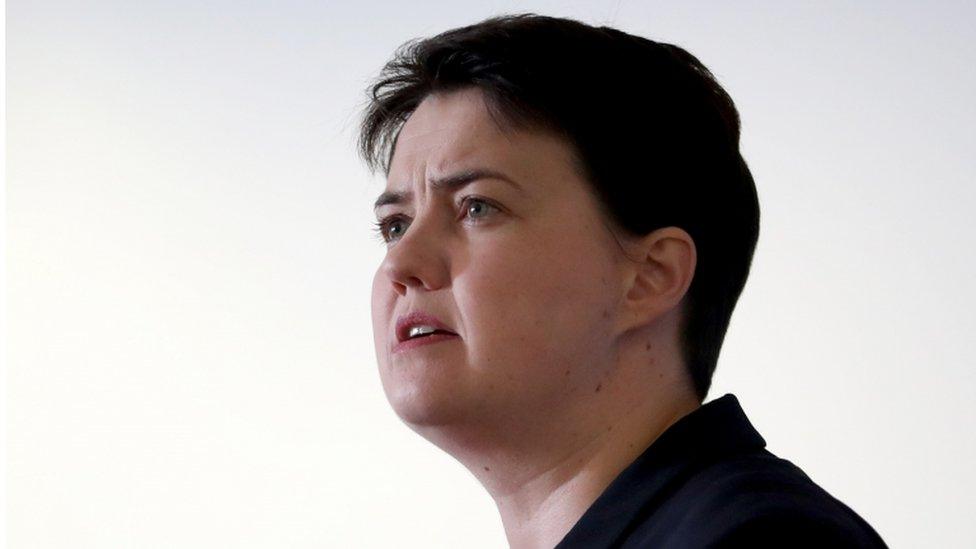Putting questions to Ruth Davidson
- Published

Ruth Davidson, she who leads the Scottish Conservatives, is rather adept at spotting a tricky question. After all, she used to pose them herself on a daily basis when she was a wireless presenter for BBC Scotland.
At one point during our interview, she accused me, in droll fashion, of seeking to ask the same question in umpteen different ways. I concurred readily.
After all, if an interlocutor is declining to answer a question in one format, then it is entirely legitimate to provide a translation into another version. And then another.
We discussed a wide range of topics from independence (she's agin it) to Brexit (ditto but she is now resigned to the prospect.)
We discussed taxation. She said she favoured substantial constraint, citing Alex Salmond as her unlikely mentor. According to the Tory leader, he had advocated tax cuts in order to stimulate the economy.
Now, Mr Salmond did indeed support, for example, a cut in corporation tax in an independent Scotland. He hoped, thereby, to boost growth and thus tax revenues.
But he declines to be corralled into Ms Davidson's corner on taxation more generally, pointing out that he led the SNP in the direction of progressive income taxation and remains a firm advocate of that approach today.
However, Ms Davidson's deployment of subtlety was most evident in two areas. That of a possible further Scottish independence referendum and that of her own future.
To recap, she is agin independence. She is, thus, unhappy about the idea of a further referendum on that topic, reminding SNP leaders that they described the 2014 poll as a once in a generation opportunity.
Which begs an obvious question. Which I, obviously, asked. If she was so against a referendum, did she envisage that Downing Street would use Westminster's reserved power over the constitution to block such a repeat poll?
Degrees of speculation
Ms Davidson characterised that as being umpteen degrees of speculation. Politicians, and I do not blame them for this, generally describe developments as "speculation" when they do not want to contemplate them at all, when they dislike the question.
Now, she has something of a point. There is not currently a referendum proposal on the table. It was taken away and tidied in the cupboard by Nicola Sturgeon when she announced that she would await further details on Brexit before reconsidering her options.
However, there is a further reason why Ms Davidson declined my invitation to speculate. If she were to outline a potential veto, that would instantly become the core element of Scottish political discourse. It would provoke, understandably, condemnation from advocates of independence.
That is why Ms Davidson sidestepped my question, preferring to argue in generic terms against the use of referendums as a device.
It is also why, when the PM previously opined on this topic, it was to say "now is not the time" for a referendum, rather than to rule it out entirely. (Although, as I noted en passant, Ms Davidson's tone signalled never.)
The second sidestep - and again I do not remotely blame Ms Davidson for this - arose with regard to her own prospects.
She has calculated, rightly, that folk tend not to trust leaders who seem too obviously discontented with their own current status, yearning for more.
Think Macbeth. "Glamis thou art…." and all that sort of thing. Tends to make the citizenry fret, even if you are only following the advice of the supernatural.
So, when I asked Ms Davidson if she still saw a career at Westminster beckoning, she affected weariness. (Actually, on reflection, maybe it was genuine. She has been asked that question rather often.)
She was perfectly content where she was. Her only aim was to supplant Nicola Sturgeon as first minister - which doesn't fall into the Macbeth category as it is a challenge contingent upon leading the largest opposition party at Holyrood.